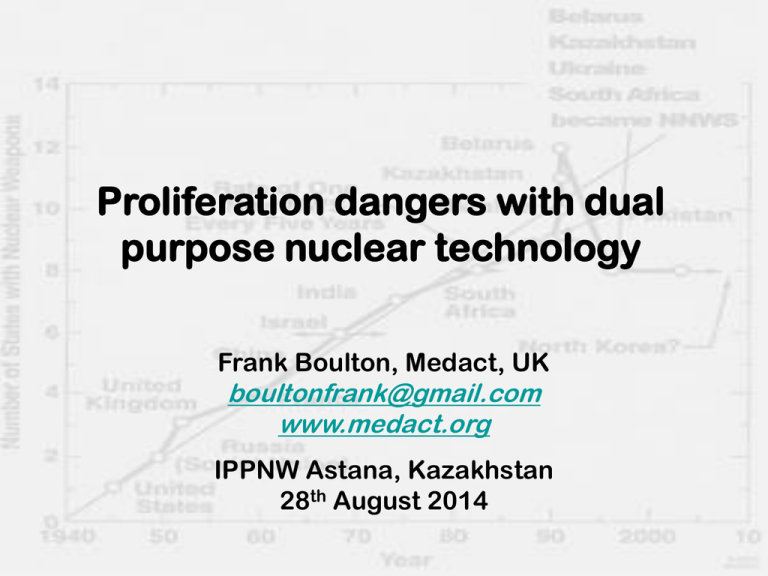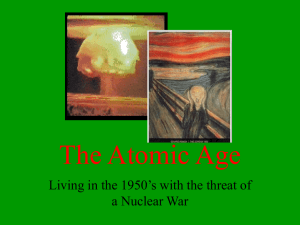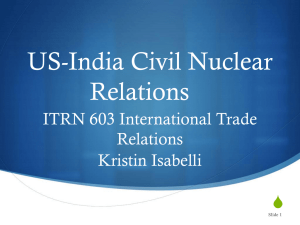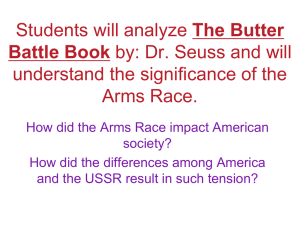Proliferation dangers with dual purpose nuclear technology
advertisement

Proliferation dangers with dual purpose nuclear technology Frank Boulton, Medact, UK boultonfrank@gmail.com www.medact.org IPPNW Astana, Kazakhstan 28th August 2014 1 Published June 2014 US Army War College Published 2012 Cornell Univ Press Published August 15, 2013 E Harrell, D E. Hoffman Belfer Center 2 Henry Sokolski 2014 Summary of ‘The Complete Proliferation Narrative’ (orthodox view – military, defense ‘experts’ etc.) • Nuclear Weapon proliferation is manageable; • Nations getting civil nuclear power plants should not make their own fuel; • Future Nuclear Power Plants can be made proliferation-resistant by strengthening IAEA; • Although several countries WILL get nuclear weapons, this will not matter as they are not useful except to deter use, which ‘we’ can easily accomplish 3 3 The reality • Diversion and proliferation are NOT manageable – Constant risks of diverting ‘civil atoms for peace’ to making weapons • Strengthening IAEA safeguards can only go so far – Little signs that this is getting serious consideration • Effective action against violators never guaranteed • Costs of NPP has never been, and never will be justified – The world not only does not need nuclear power, it would be better off with no NPPs • There is NO logic or justification for possessing nuclear weapons. – Possession will always matter – Human frailty means that nuclear war is inevitable while nuclear weapons exist 44 There is no “silver bullet” technology that can be built into an enrichment plant or reprocessing plant that can prevent a country from diverting its national fuel cycle facilities to nonpeaceful use. Review of DOE’s Nuclear Energy R&D Program, 2008 http://www.nap.edu/openbook.php?record_id=11998&page=50 5 France France has two kinds of nuclear materials: those that are free for any use, and those that can be used only for peaceful purposes under international agreements …. France has the options to use any free materials for our military program Michel Pecqueur; Chair, French Atomic Energy Commission, 1978 -1983 France built between 63 and 250 nuclear weapons using plutonium that was produced in civilian power plants Moving beyond pretense 2014 6 6 Atomic Assistance (‘AA’) • Nuclear technology is dual use in nature • Despite concerns about proliferation, nuclear states have regularly shared technology, materials, and knowledge for peaceful purposes with others. • Governments use peaceful atomic assistance as economic tools of statecraft • Nuclear suppliers hope they can reap the benefits of foreign aid without undermining security. Such trade • improves relationships with allies, • limits the influence of adversaries, • enhances energy security by gaining favourable access to oil • Result - providing peaceful nuclear assistance inadvertently helps to spread nuclear weapons 7 7 AA cases resulting in weapons’ programmes • U.S. civilian nuclear assistance to Iran; 1957 to 1979 – helped by Johnny Walker! • Soviet aid to Libya from 1975 to 1986 • French, Italian & Brazil exports to Iraq, 1975 to 1981 • U.S. cooperation with India from 2001 to 2008 • Research on why states considered NW programs – countries receiving more AA more likely to pursue & get the bomb – especially if they get into an international crisis after receiving aid • In some of the ‘more stable’ countries, the interval between AA and weapons pgm can be up to 25 yrs – often after a change of regime, e.g. Pakistan (early 1950s to late 1970’s) 8 8 Conclusions 1 • Countries give AA mostly to further commerce and foster trading relations – Keep recipients on their ‘good side’ • Diversion to military use is a recognised risk but such recognition is sublimated to ‘national interest’ • Several successful and some unsuccessful diversions – only one country has genuinely disarmed (S Africa) – FW de Klerk 2014; Rautjärvi 2014. MCS vol 30 suppl 1 – Ukraine, Belarus & Kazakhstan deserve some commendation • NPT ‘bargain’ of limited success, – ‘home-enrichment’ etc is NOT prevented by NPT • IAEA is poorly resourced already and woefully unprepared for probable increased workload, – lacks enforcement powers in spite of the ‘Additional Protocol’ 9 9 Conclusions 2 • A fundamental flaw in NPT thinking – Civil Nuclear Energy (CNE) a safe compensation (sop) to powers not possessing nuclear weapons – While the classic “Three Pillars” philosophy of NPT continues some NNWS will always hide their NW ambitions behind ‘Atoms-for-Peace’ clothing. • nuclear nonproliferation, disarmament, peaceful use of CNE • Meantime, the IAEA must be strengthened – either itself or another agency given powers • of enforcement, backed up by • legal outlawing nuclear weapons, old and new 10 10 Additional observations 13 Civil nuclear power is – Very expensive – Very dangerous (proliferation, waste, health) – Can be downgraded, but only with difficulties (decommissioning technology, disposal and costs, etc) – Is not needed – Nuclear fusion prospects (ITER) remain far off Renewables hold much promise but need radical and very disruptive revolutions – – – – in Economy Technical infrastructure Social attitudes We cannot assume that Carbon Capture & Storage (CCS) technology will provide reliable permanent solutions • Which puts more pressure on Renewables and Nuclear sources But we can develop a nuclear-free and excess GHGemission-free world for 10 billion or even more people 11 Time line 1957 Accident at Windscale, Cumbria. IAEA established 1962 Cuban Missile Crisis 1967 Israel acquires NWs 9 yrs after starting its weapons programme 1968 NPT opens to signature; into force, 1970: China & France accede 1992 1972 India’s first test 1972 – 75 Rasmussen report (NPPs ‘very safe’ but beware Tsunami ! ) 1977 Sanctions applied to South African NW programme 1978 UNGA Session on Disarmament (Alarmed by the threat to the very survival of mankind posed by the existence of nuclear weapons and the continuing arms race…. ) 1979 USSR invades Afghan. US ↓ restrictions on Pakistan’s civil programme TMI accident. South Africa’s first test 1986 Chernobyl 1987 Pakistan’s first test 1990 South Africa disarms 1991 Gulf War – sanctions on Iraq. STARTI by US & Russia (STARTII, 1994) 1997 Additional Protocol – IAEA ‘accountants to detectives (to door-to-door salesmen? ’) 2003 N Korea withdraws from NPT 2005 US-India deal 2011 Fukushima; New START 12 2013 New ‘Oslo’ process; work of UN’s “OEWG” 12 l l l l l l l l l l l l l l l l l IAEA Fr Ch Isr NPT Ind SAf Afg/USSR Pak GW AP NK USCuba sanc UN TME Start1 out India SAf SAf Uk/Bel/Kaz l New Start 13 14 April 1, 2011. 437 nuclear reactors operating in 30 countries July 1, 2014. 388 nuclear reactors operating in 31 countries 72 more under construction, 174 planned, 299 proposed 15 http://en.wikipedia.org/wiki/Generation_IV_reactor 16 Chemistry of spent nuclear fuel 1 Fissile products of U235 & Pu239 Isotopes in groups of unequal sizes , somewhat smaller e.g. Sr90 somewhat larger e.g. I131, Cs137, and Lanthanides These are often very radioactive and short-lived Fast neutrons, which transmutate fuel (U238) to Transuranic heavy metals, incl actinides e.g. Pu239 long half-lives & remain after fission products decay in the ‘spent fuel cooling ponds Pu239can be extracted from spent fuel ‘PUREX’ processing (Pu/U reduction/extraction with tributyl phos). Not easy as the accompanying lanthanides etc. are so ‘hot’ and lanthanides and actinides have similar chemical properties 17 17 http://en.wikipedia.org/wiki/Fission_products_(by_element) 18 ‘Once-through’ cycles • In the ‘once-through’ cycles, characteristic of USA practices, spent fuel is sent for permanent disposal – ultimately in ‘Geological Disposal Depositories’ • In UK, spent fuel is recycled and is accumulating, originally for Pu bombs and therefore very proliferation-prone: and also for making controversial ‘MOX’ fuels which are still causes for concern (technical to NPP design, and proliferation-prone) 19 Problems of spent fuel • Short term, need to be cooled – which failed in Fukushima • Long term, safe storage – Surface casks, for decades – Geological disposal – but where?? • Recycle into Gen III and Gen IV NPPs – Prone to proliferation 20 Current UK Nuclear Generation and Planned to 2030 by NDA (“Nuclear Decommissioning Authority”) Current nuclear capacity in the UK is 9.23GW. This is expected to decline substantially as plants ‘end of life’ approaches in mid-2020’s. 8 new nuclear designated sites contained within Nuclear National Policy Statement. Firm site development plans for Hinkley, Sizewell, Wylfa, Oldbury and Moorside 21 Windscale fire October 1957 Graphite overheated and fire broke out Air from fan fuelled fire Nuclear contaminants travelled up chimney Filter (“Cockroft’s folly”) blocked some but not all contaminated material Radioactive cloud spread over UK and Europe 750 TBq (20,000 curies) released incl 22 TBq Cs137 and 740 of I131 22 Sellafield notoriety – Fire 1957, – THORP – grade 3 leak in 2005 – MOX quality fabrication in 1999 - £40m compensation to Kansai – >100 Tonnes Pu on site • 10 – 20 thousand Nagasaki equivalents • Between a third and a half of world military total – Main waste storage site for UK – Possible leukaemia cluster (also at Dounreay) 23 23 Purpose of Windscale To produce military Pu; then H3 for thermo-nuclear bombs, for which the air cooling was reduced and led to the 1957 fire! 1952 First UK test of a nuclear weapon used 7Kg Pu, yield 25 Kt ‘Operation Hurricane’, on HMS Plym, a WW2 anti-submarine frigate moored off Trimouille Island, W Australia Fall-out as far as Rockhampton But from where was the U (3000 Km away) mined for this Pu? answer - Australia! (TA Ruff, MCS 2014 vol 30 suppl 1) 24 World Nuclear Exhibition 14 – 16 October 2014, Paris TRADESHOW ACCESS PROGRAMME (TAP) FUNDING OF £1,500 – UKTI are offering 7 TAP grants to eligible SMEs for this exhibition. Contact us for more details. Please return the form to: Raelene Wilcock Head of Overseas Events raelene.wilcock@the-eic.com EIC, 89 Albert Embankment, London, SE17TP 25 IAEA, 1957 IAEA is autonomous, with a Board of Governors and a General Conference of its 164 Member States. It relates to the NPT, and reports to UNGA and UNSC 26 IAEA Missions and Priorities – Promoting the peaceful uses of nuclear energy by its member states, – Implementing safeguards to verify that nuclear energy is not used for military purposes – Nuclear safety: Promoting high standards BUT – It is not clear which should take priority – No consensus on handling violators (IAEA & NPT) 27 Iraq 1991 ( Gulf War 1 et seq ) https://www.iaea.org/Publications/Booklets/Iraq/iraqindex.html • Violations – Undeclared nuclear materials and activities • “Conclusive evidence" of a – complex, comprehensive NW development program – with broad-based international procurement – continued attempts to conceal its true extent • Nov 15 The first removal of HEU • Some fresh fuel for the Soviet IRT 5000 reactor ‘of concern’ - they couldn’t find it! 28 28 Iraq 1991 ( Gulf War 1 et seq ) https://www.iaea.org/Publications/Booklets/Iraq/iraqindex.html • Feb 1992 Facilities to produce U feedstocks found at Mosul - planned site of future production facility for UF4 • Fuel from Tammuz-2 reactor & pond sent to emergency storage – pits in a farmland area a few miles from the Nuclear Centre. • 400 tons (incl natural U & 6 gms Pu) declared during the 5th inspec’n • Oct & Nov 1991 – special equipment for warhead assembly found • Iraq's response to IAEA – denial of clandestine activities until evidence became overwhelming, – followed by co-operation. As a consequence – IAEA not confident that all prohibited activities have been disclosed 29 Other IAEA performances in safeguarding • South Africa, as part of self-declared disarmament • Iran (reported by Iranian opposition party) • Libya (self-revealed by Gaddafi) • N Korea (revealed by US satellites) • S Korea (self-admitted fake certificates for reactor parts, 2013-14) • Degelen Mt (Semipalatinsk clear-up, 2000’s) Not involved (trusted) “The IAEA needs greater authority and better technology” 30 Additional Protocol 1997 including unintended consequences • Encouraged S Korea to admit fake safety certificates (?) • But raises expectations in IAEA performance without increasing resources • Might encourage fewer inspections of countries signing up to it • Signing up may confer ‘preferred traveller’ status 31 WILL MORE INSPECTIONS BE NEEDED? • In 2010 the IAEA conducted – 1,750 inspections, – 423 design information verifications, and – 142 complementary accesses – UN Secretary General Ban-Ki Moon visits Semipalatinsk with IAEA Deputy Director-General Olli Heinonen. • In 2012, IAEA had 1125 facilities under safeguards, • By 2030, – nuclear electrical generation may be 40 to 120% more – and 10 to 25 new countries may get NPPs • “We must do more with less without compromising” – But UN policy is to maintain zero real growth in budgets – So more materials inspected but by the same staff number – In spite of 115 countries agreeing to be subjected to the AP 32 The Madness of Semipalatinsk after 1991 At Degelen Mountain, Kazakhstan, in the wake of the testings at Semipalatinsk, c 290 Kg Pu was left in ‘bore holes’ easily available to scavengers on site when, in the after-math of ‘9/11’, the US withdrew funds for clearing-up by teams from Kazakhstan, US and Russia. The IAEA was kept officially in the dark, according to two former officials. 100 Kg more was admitted later; even now, some remains. But the clearing–up exercise was a very creditable example of US-Russia-Kazak co-operation in a spirit sorely needed now http://belfercenter.ksg.harvard.edu/publication/23327/plutonium_mountain.html 33 How do we know that the IAEA’s safeguards system is not ripe for catastrophic failure? Safeguards could be like a Titanic that has been 34 lucky enough not to strike an iceberg Energy sources at years 2000; and projected at the various RCP in 2100 (IPCC, 2013) Figure 14: Energy sources by sector (van Vuuren et.al. 2011) http://www.skepticalscience.com/rcp.php?t=3 35 HMS Dreadnought (UK) coal-powered (oil later) launched 1906 : crew, 700-810 displacement 18,120 long tons cost £2,000,000 (1906) USN Gerald R Ford; Nimitz class aircraft carrier (USA) launched 2013 nuclear powered crew; 500 officers, 3,700 enlisted displacement 100,000 long tons cost $11,400,000,000 (2014) HMS Victorious (UK) launched 1993 nuclear powered crew 160 displacement 18,000 tonnes cost “at least £1.5 billion each” 36 Arms race 1906 to 1914 – Dreadnought battleships August 1914: ‘England’ vs Germany 34 - 24 37 Top 10 Nuclear Power Countries in the World http://www.whichcountry.co/top-10-nuclear-power-countries-in-the-world/ 38 THANKS 39







![The Politics of Protest [week 3]](http://s2.studylib.net/store/data/005229111_1-9491ac8e8d24cc184a2c9020ba192c97-300x300.png)